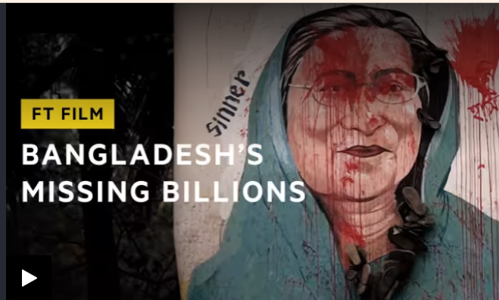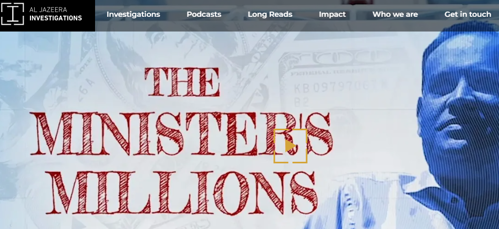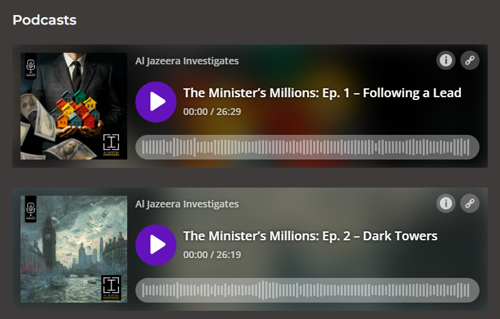
Annually $16 billion of illicit financial flows into the UK and other IFC with effortless impunity.
12/09/2025
A FT Film "Bangladesh’s Missing Billions, Stolen in Plain Sight" presents a powerful exposé of systemic corruption in Bangladesh, revealing how an estimated $234 billion was allegedly siphoned off from the country.
This FILM follows the news that the interim government of Bangladesh, led by economist and Nobel Peace Prize winner Muhammad Yunus, estimates that
- Illicit financial flows out of the country may have been as high as $16 billion annually during Hasina’s rule.
- An estimated $234bn was allegedly plundered from Bangladesh during Sheikh Hasina's 15-year reign as prime minister.
- Much of this flowed into the UK and other financial centres with effortless impunity.
One year on from the fall of Sheikh Hasina’s regime, this superb film on Bangladesh’s missing millions from the Financial Times, featuring Spotlight on Corruption Deputy Director Helen Taylor, brings home the urgency of recovering stolen assets that have been stashed in the UK.

https://www.youtube.com/watch?v=usUFFxklzas&t=4s
The FT Film titled "Bangladesh’s Missing Billions, Stolen in Plain Sight" explores:
- How the money was stolen: It delves into systemic corruption involving government officials, business elites, and international networks.
- The impact on Bangladesh: The loss of such vast sums has severely affected infrastructure development, public services, and poverty alleviation efforts.
- Global complicity: It also highlights how foreign banks and jurisdictions may have facilitated or disregarded the laundering of stolen funds.
THE FILMS' KEY FINDINGS & THEMES
- Scale of Corruption
- The film estimates that $234 billion has been stolen over the years, an amount that dwarfs Bangladesh’s annual GDP.
- This figure is based on leaked documents, whistleblower accounts, and investigative journalism.
- Political Protection & Elite Networks
- Much of the alleged theft occurred under the administration of Prime Minister Sheikh Hasina, with claims that influential political figures and their associates were involved.
- The film suggests that corruption is not just tolerated but institutionalised, with state mechanisms used to shield perpetrators.
- International Financial Systems
- The stolen funds were often laundered through foreign banks, shell companies, and offshore jurisdictions.
- The film criticises the global financial system for enabling this theft, pointing to weak enforcement of anti-money laundering laws.
- Impact on Citizens
- Despite economic growth, millions in Bangladesh remain in poverty.
- The stolen billions could have funded education, healthcare, infrastructure, and climate resilience—areas where Bangladesh is critically vulnerable.
- Whistleblower Risks
- Journalists and whistleblowers who expose corruption face intimidation, arrest, or worse.
- The film includes interviews with individuals who risked their lives to reveal the truth.
- Lack of Accountability
- Few high-profile prosecutions have occurred.
- The judiciary and law enforcement are portrayed as compromised or politically influenced.
Narrative Style & Impact
- The documentary uses interviews, archival footage, and data visualisations to build a compelling case.
- It aims to raise international awareness and pressure institutions to act against financial crime.
🏦 As Helen explains in the film, London has long been a magnet for dirty money, as a significant and open financial market with an army of professional enablers on hand to set up bank accounts and companies, buy houses and manage properties, and launder reputations.
IN ADDITION, Al Jazeera Media Network has reported on the matters and posted two podcasts
- 🔎 Brilliant investigative work by the Financial Times and Al Jazeera Media Network uncovered how former land minister of Bangladesh, Saifuzzaman Chowdhury, bought more than 300 properties in the UK alone worth £180m, now frozen as the National Crime Agency (NCA) investigates: 🔗 https://lnkd.in/eZ_F4s89 https://www.ajiunit.com/investigation/the-ministers-millions/


👉 Much more remains to be done –
- not only to recover the missing millions from Bangladesh but to chase down the billions in illicit wealth that kleptocrats and corrupt elites from around the world have hidden in plain sight in the UK – from luxury London properties to flashy cars.
SOURCES
- https://lnkd.in/eh6Hv7Dn
- https://www.linkedin.com/feed/update/urn:li:activity:7371908674656714752/
- https://lnkd.in/eMTW6kfi
- https://www.ft.com/content/123f6740-0f26-47f1-b1c9-f9cd515a52a4
- https://www.ft.com/video/99e12ca5-8059-4a88-a27b-d4e1f6079084?playlist-name=section-9261403f-453d-4e4d-be10-c2439191663b&playlist-offset=0
- https://www.ajiunit.com/investigation/the-ministers-millions/
- https://www.youtube.com/watch?v=usUFFxklzas&t=4s
The Team
Meet the team of industry experts behind Comsure
Find out moreLatest News
Keep up to date with the very latest news from Comsure
Find out moreGallery
View our latest imagery from our news and work
Find out moreContact
Think we can help you and your business? Chat to us today
Get In TouchNews Disclaimer
As well as owning and publishing Comsure's copyrighted works, Comsure wishes to use the copyright-protected works of others. To do so, Comsure is applying for exemptions in the UK copyright law. There are certain very specific situations where Comsure is permitted to do so without seeking permission from the owner. These exemptions are in the copyright sections of the Copyright, Designs and Patents Act 1988 (as amended)[www.gov.UK/government/publications/copyright-acts-and-related-laws]. Many situations allow for Comsure to apply for exemptions. These include 1] Non-commercial research and private study, 2] Criticism, review and reporting of current events, 3] the copying of works in any medium as long as the use is to illustrate a point. 4] no posting is for commercial purposes [payment]. (for a full list of exemptions, please read here www.gov.uk/guidance/exceptions-to-copyright]. Concerning the exceptions, Comsure will acknowledge the work of the source author by providing a link to the source material. Comsure claims no ownership of non-Comsure content. The non-Comsure articles posted on the Comsure website are deemed important, relevant, and newsworthy to a Comsure audience (e.g. regulated financial services and professional firms [DNFSBs]). Comsure does not wish to take any credit for the publication, and the publication can be read in full in its original form if you click the articles link that always accompanies the news item. Also, Comsure does not seek any payment for highlighting these important articles. If you want any article removed, Comsure will automatically do so on a reasonable request if you email info@comsuregroup.com.


